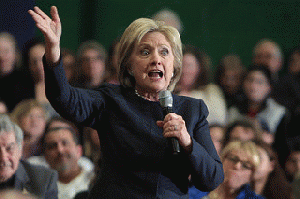Hillary Clinton is an exceptionally skillful politician. Collectively, she and her husband Bill have parlayed their political experience into at least $125 million in speaking fees alone. According to Bloomberg, Hillary was paid $12 million in the 16 months after leaving her role as US secretary of state. Knowing she'd likely run for president, Goldman Sachs, Deutsche Bank and Morgan Stanley (and other big Wall Street corporations) gladly paid her $2.9 million in speaking fees alone. The same Wall Street corporations then gave her campaign super PACs millions more. Coincidence?
Clinton is surely aware that Wall Street won't give politicians millions without expecting something big in return. In a Des Moines Register interview, she justified her $250,000-per-event Wall Street speaking fees, saying, "What they were interested in were my views on what was going on in the world ... there's a lot of interest in getting advice and views about what you think is happening in the world." Does she honestly expect the American people to believe Wall Street pays her $250,000 for a one-hour talk because they want her views on the world? She most surely knows that Wall Street wants her political influence.
In that same interview (as if to say, "Bernie does it too"), Clinton attacked Bernie Sanders for his 2000 vote for deregulating swaps and derivatives (the Commodity Futures Modernization Act), which was one of the main causes of the economic collapse in 2008. Of course, she didn't mention that Sanders forcefully spoke out against the bill, and Sanders, like the rest of Congress, was essentially blackmailed into voting for it. She didn't mention the bill was inserted at the last minute in omnibus legislation needed to keep the government going. She didn't mention only four members of Congress dared to vote against it. She didn't mention the bill came from a deal between her husband and the Senate Banking Committee chairman, Phil Gramm. Bill Clinton signed the bill into law, ensuring Hillary would collect millions from Wall Street for her Senate campaign (and she did).
After speaking at a town hall in Manchester, New Hampshire, in January, Hillary Clinton was asked if she would release the transcripts of her $600,000 speeches to Goldman Sachs (a bank that just agreed to pay $5 billion for mortgage fraud). She laughed and turned away. Political pop quiz: Would those transcripts reveal: A) Clinton telling Goldman Sachs, "cut out that mortgage fraud right now" or B) Clinton pandering for super PAC campaign money?
Clinton distorted Bernie Sanders' single-payer health-care plan in a deceitful way. She emphasized the billions in taxes that would be needed to fund a single-payer system without mentioning the many billions more that would be saved by eliminating individual and company health-care premiums. As a well-informed advocate of health-care reform, she's surely aware single-payer countries provide generally superior health care for less than half of what we pay - for everyone. She's also surely aware single-payer would cost the giant health insurance corporations billions in profits. According to The Intercept, from 2013 to 2015, Clinton took in $2.8 million (on top of the above $2.9 million) from 13 paid speeches to the health-care industry. Does she honestly expect the American people to trust her judgment about single-payer health care?
Clinton conveniently reversed her positions on several big issues including the North American Free Trade Agreement (NAFTA), immigration, gun control, the Keystone XL pipeline, the Trans-Pacific Partnership, the Iraq war and same-sex marriage. In each of these "evolutions," she went from a less popular position (among liberal Democrats) to a more popular one. Coincidence? She insists her flip-flops were motivated by new or better information, but she often evades citing clear examples. What new information did she suddenly discover about same-sex marriage that changed her mind other than polls showing growing public support among liberal Democrats?
Assume Clinton's being honest. Assume it wasn't political expediency, but rather new or better information that motivated her reversals on these major issues. What does that say about her future judgment? Many, including Bernie Sanders, got these issues right the first time.
George Orwell said, "In a time of universal deceit - telling the truth is a revolutionary act." It appears that Clinton isn't ready to go quite that rogue.
(Note: You can view every article as one long page if you sign up as an Advocate Member, or higher).





